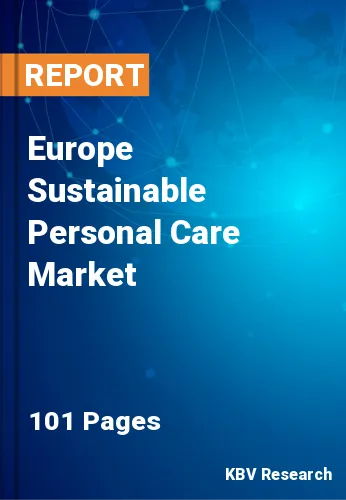The Europe Sustainable Personal Care Market would witness market growth of 8.9% CAGR during the forecast period (2022-2028).
Sustainable personal care has evolved to include the concept of holistic well-being, which entails engaging in behaviors that care for the body, mind, soul, and environment. Additionally, the routines can ideally assist the health of a person over time, rather than merely for a day or two. Caffeine, for example, can make a consumer feel stimulated for a short time and motivate them, but the sensation may not last. Instead of relying on coffee, a sustainable personal care practice focused on enhancing sleep quality can bring a little additional freshness to the day. Simultaneously, it can also eliminate the impact of artificial and inorganic products on the environment.
Ultimately, brands are rising to the challenge and becoming more upfront about their sustainability efforts. New developments, such as using post-consumer recyclable plastic for packaging, creating bottles that are easier to recycle, using more biodegradable materials, and being conscious of ingredient sourcing are all helping to reduce environmental impact while still offering effective products. Moreover, it is not necessary to sacrifice quality to make eco-friendly changes to the daily routine. Sustainable personal care products not only meet the sustainability criteria of consumers, but it also meets their standards for a serum, shampoo, or lipstick.
A comprehensive EU strategy on chemical safety is in place. For example, the REACH Regulation aims to ensure the safe use of chemicals by limiting consumer and worker exposure to dangerous compounds. On labels and packaging, the CLP Regulation139 gives danger information. Specific chemical groups, such as biocides, insecticides, medicines, and cosmetics, are regulated separately. Endocrine-disrupting chemicals, combination effects, and chemicals that are pervasive and bio-accumulative inside the environment and organisms are among the issues being addressed in the implementation of chemicals regulations.
The European Chemicals Agency (ECHA) policy to promote substitution to safer chemicals 140 as well as the OECD survey141 of how Member Countries assist alternative evaluation and substitution of chemicals of concern are two initiatives targeted at chemical substitution. A current study is looking into the motivations of frontline manufacturers who are replacing specific chemicals in their manufacturing processes with more sustainable alternatives, even if the compounds being replaced are not subject to REACH or other limits. Because policy tools addressing safe chemical use frequently include measures aimed at decreasing exposure to toxic chemicals, they also help to prevent and reduce wasteful chemical usage, and so contribute to resource efficiency. This encourages advancements, such as self-healing paint142, which could lead to more long-lasting applications.
The Germany market dominated the Europe Sustainable Personal Care Market by Country in 2021, and would continue to be a dominant market till 2028; thereby, achieving a market value of $6,298.5 million by 2028. The UK market is poised to grow at a CAGR of 8% during (2022 - 2028). Additionally, The France market would display a CAGR of 9.7% during (2022 - 2028).
Based on Nature, the market is segmented into Organic and Natural & Green. Based on Sales Channel, the market is segmented into Hypermarkets & Supermarkets, Online Retail, Specialty Stores, and Others. Based on Type, the market is segmented into Skin Care, Hair Care, Oral Care, Hygiene Products, and Others. Based on countries, the market is segmented into Germany, UK, France, Russia, Spain, Italy, and Rest of Europe.
Free Valuable Insights: The Global Sustainable Personal Care Market will Hit $93.8 Billion by 2028, at a CAGR of 9.4%
The market research report covers the analysis of key stake holders of the market. Key companies profiled in the report include L'Oreal Group, Johnson & Johnson, The Procter and Gamble Company, Unilever PLC, Kao Corporation, The Colgate-Palmolive Company, Estee Lauder Companies, Inc., Coty, Inc., L'OCCITANE Group, and Weleda AG.
By Nature
By Sales Channel
By Type
By Country
Our team of dedicated experts can provide you with attractive expansion opportunities for your business.

